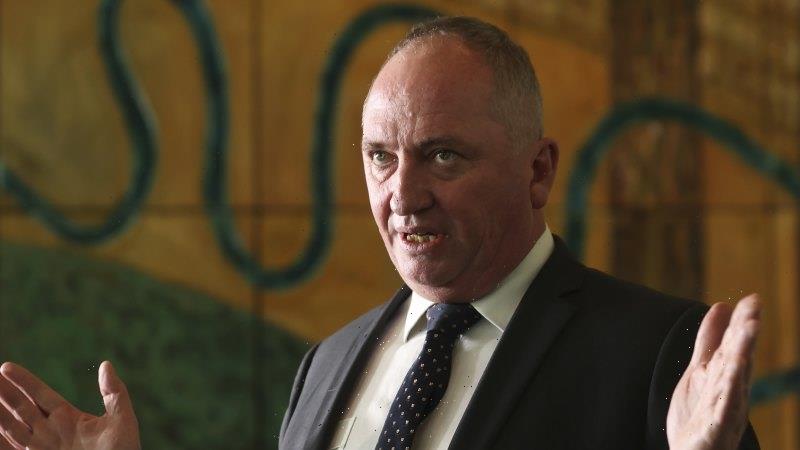Deputy Prime Minister Barnaby Joyce says he doesn’t care if the latest round of a regional grants program that disproportionately funnelled money to Coalition seats is labelled pork-barrelling.
He has also boosted the amount of taxpayer money going to community organisations and regional councils, announcing $300 million of grants rather than the $207 million budgeted a year ago.
Deputy Prime Minister Barnaby Joyce has added $100 million to a $200 million regional grants program.Credit:Alex Ellinghausen
The surprise $100 million added to the Building Better Regions Fund’s fifth round will be included in the mid-year budget update in December. It comes on top of the $256 million allocated in May’s budget for a sixth round, expected to open for applications later this year.
Asked whether it was Mr Joyce’s idea or that of his predecessor as Nationals leader and Regional Development Minister, Michael McCormack, to increase the round’s funding, a spokesman said it was a decision of cabinet. He did not say how many more projects were funded beyond the original budget allocation.
The $1.38 billion fund’s grants are allocated by a ministerial panel once the Infrastructure Department assesses the projects’ economic and social benefits to regional and remote areas and whether applicants can deliver them. Mr Joyce leads this panel of ministers with regional responsibilities.
In previous rounds, the ministerial panel led by Mr McCormack went against the department’s recommendations for a third of projects that received money.
The Auditor-General is scrutinising the program but isn’t due to report until May 2022.
The government has come under fire for grants programs for commuter car parks and sporting facilities that also favoured Coalition seats.
In the Building Better Regions Fund’s fifth round of grants, 298 projects across 68 regional and rural electorates received money.
Applications closed in March; it had been expected the successful projects would be announced mid-year. Mr Joyce returned as Nationals leader in late June.
While Coalition-held seats made up 60 per cent of eligible regional and rural seats, projects in them received 72 per cent of the funding. Seats held by Labor accounted for 34 per cent of those eligible but received only 16 per cent of the funding. Overall, 90 per cent of the funding from this round of grants went to projects in electorates already held by the Coalition or marginal seats held by others.
More than half of Labor’s regional seats are marginal, whereas those held by Coalition MPs are overwhelmingly safe.
Opposition infrastructure spokeswoman Catherine King said the numbers didn’t lie.
“Communities across Australia have projects that are worthy of funding, but Barnaby Joyce and Scott Morrison can only see those in Coalition seats,” she said.
The largest grant, for the maximum $10 million on offer, went to Lake Macquarie City Council for a three-storey extension of its sports centre in Glendale. This is in the marginal seat of Hunter, where Labor’s Joel Fitzgibbon is retiring.
Mr Joyce held a press conference at the site on Monday with the Nationals’ candidate for Hunter, James Thomson, and Lake Macquarie’s mayor, Kay Fraser.
He said questions about money allocated to regional seats were unfair because the same questions did not get asked about infrastructure spending in big cities.
“The next question, is it pork-barrelling? It drives me insane,” he said. “Something magical happens – you cross over the Hawkesbury and it’s pork-barrelling.
“I don’t care what they call it, we’re going to drive to make sure that people, whether in Lake Macquarie, whether in Muswellbrook, Singleton, Tamworth, Wellington, if they go out to Dubbo … get some services out here.
“We want sporting facilities and we’re going to go in and fight for them.”
Hunter was the most successful Labor-held seat in this round by dollar figure while Lingiari in the Northern Territory, where long-time member Warren Snowdon is also retiring, was the top by number with seven successful projects.
Safe Coalition seats Barker in South Australia and Calare in NSW had the most successful projects, with 16 each. Durack, another safe seat that accounts for about two-thirds of Western Australia’s landmass, received the most money, with $18.5 million set to flow into its region.
Crossbench MP Bob Katter’s seat of Kennedy in northern Queensland received five grants worth a combined $17.5 million. More than half of this, $9.7 million, went to the Royal Flying Doctor Service to redevelop its Mt Isa base.
Another 11 grants, worth almost $3.2 million, went to projects in Mayo, which is held by Centre Alliance’s Rebekha Sharkie. It’s traditionally been a Liberal seat.
The Morning Edition newsletter is our guide to the day’s most important and interesting stories, analysis and insights. Sign up here.
Most Viewed in Politics
From our partners
Source: Read Full Article

